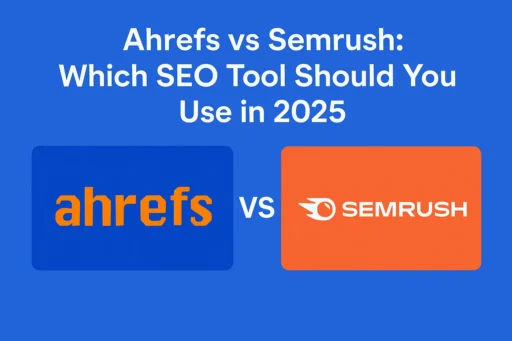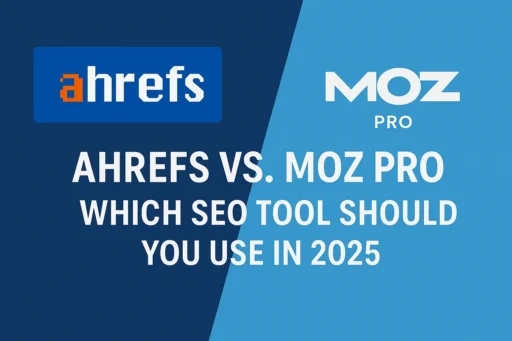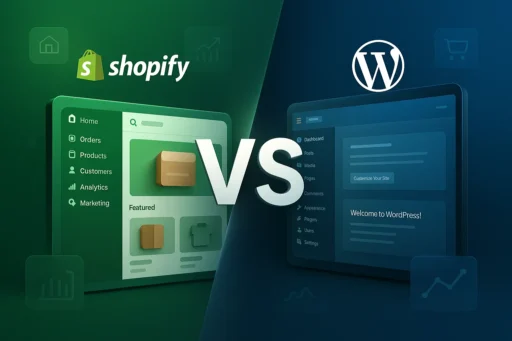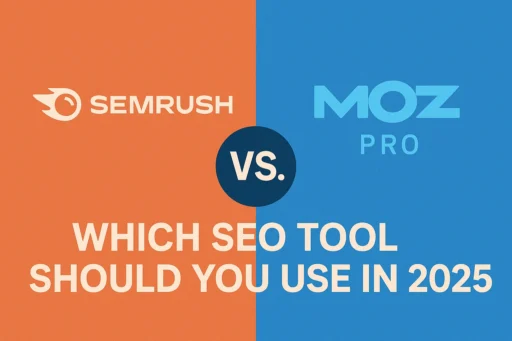Ahrefs vs Semrush remains one of the most debated topics in the digital marketing world, and for good reason. Both platforms have established themselves as industry leaders, offering comprehensive solutions for businesses looking to improve their search engine visibility. At Search Savvy, we’ve spent countless hours testing both tools across various projects, and we understand that choosing the right SEO tool can significantly impact your marketing success and budget.
SEO tools have become indispensable for modern digital marketing strategies, helping businesses analyze competitors, track rankings, discover content opportunities, and build authoritative link profiles. The challenge isn’t whether you need an SEO tool-it’s determining which one aligns best with your specific goals, team size, and budget constraints. At Search Savvy, we’ve witnessed how the right platform can transform a struggling campaign into a high-performing asset.
This comprehensive comparison will walk you through the key differences between Ahrefs and Semrush, examining their strengths, weaknesses, pricing structures, and ideal use cases. Whether you’re a solo entrepreneur, an agency professional, or part of an in-house marketing team, understanding these distinctions will help you make an informed decision that maximizes your return on investment.
What Are Ahrefs and Semrush?
Ahrefs vs Semrush comparisons start with understanding what each platform fundamentally offers. Ahrefs launched in 2010 as a backlink analysis tool and has since evolved into a comprehensive SEO platform known for its massive link index and intuitive interface. The company crawls over 8 billion pages daily, maintaining one of the most extensive databases of live backlinks in the industry.
Semrush, founded in 2008, began as a competitive research tool and has expanded into an all-in-one digital marketing suite. Beyond traditional SEO functions, Semrush incorporates PPC analysis, social media management, content marketing tools, and market research capabilities. This broader scope makes it particularly attractive to agencies and businesses managing multiple marketing channels simultaneously.
Both platforms serve similar core purposes-keyword research, site auditing, rank tracking, and competitor analysis-but they approach these tasks differently. At Search Savvy, we’ve found that the “best” tool often depends less on objective superiority and more on which features matter most to your specific workflow and marketing objectives.
How Does Keyword Research Compare Between Ahrefs and Semrush?
SEO tool selection often hinges on keyword research capabilities, as this forms the foundation of most optimization strategies. Semrush’s Keyword Magic Tool provides keyword data for over 20 billion keywords across 130 databases, offering extensive international coverage. Its interface delivers highly detailed metrics including search volume, keyword difficulty, competitive density, and SERP features, making it excellent for comprehensive keyword planning.
Ahrefs’ Keywords Explorer counters with approximately 7 billion keywords across 170 countries, featuring a cleaner interface that many users find more intuitive. The platform presents data in a straightforward manner, with particularly strong “Parent Topic” suggestions that help you understand content grouping opportunities. Ahrefs also provides “clicks” data alongside search volume, revealing how many searchers actually click on results-a crucial distinction for high-value keywords.
Ahrefs vs Semrush becomes a matter of preference in this area. Semrush offers more keyword suggestions and integrates PPC cost data seamlessly, which is invaluable if you’re running paid campaigns alongside organic efforts. However, Ahrefs provides more accurate difficulty scores according to many SEO professionals, potentially saving you time by helping you target genuinely achievable keywords.
Search Savvy’s experience shows that both tools excel at keyword discovery, but Semrush edges ahead for comprehensive digital marketing campaigns while Ahrefs wins for pure SEO-focused strategies. Consider your primary use case: if you’re coordinating SEO and PPC efforts, Semrush’s integrated data becomes extremely valuable. If you’re laser-focused on organic rankings, Ahrefs’ streamlined approach may serve you better.
Why Is Backlink Analysis Important in 2025?
SEO tools must provide robust backlink analysis because links remain a critical ranking factor despite evolving search algorithms. Ahrefs’ Site Explorer built its reputation on backlink data and continues to lead in this area with the industry’s most comprehensive link index. The platform updates its backlink data approximately every 15 minutes, providing near real-time insights into your link profile and competitor activity.
Ahrefs vs Semrush comparison in backlink analysis reveals notable differences in database size and update frequency. Ahrefs reportedly crawls and indexes more backlinks than any competitor, making it the go-to choice for link-building professionals and agencies. Its tool presents backlink data with exceptional clarity, including referring domains, anchor text distribution, and powerful filtering options.
Semrush’s Backlink Analytics has improved its database significantly in recent years, but most SEO professionals still consider Ahrefs superior in this specific category. The tool provides solid functionality for most users, offering insights into toxic links, competitor backlink gaps, and link-building opportunities. However, the database remains smaller and updates occur less frequently than Ahrefs.
For businesses where link building represents a primary growth strategy, this distinction matters considerably. At Search Savvy, we recommend Ahrefs when backlink analysis constitutes a major part of your SEO workflow, particularly for agencies managing multiple client link campaigns or businesses operating in highly competitive niches where detailed competitor backlink intelligence provides strategic advantages.
How Do Site Audit Features Compare?
Ahrefs vs Semrush site audit capabilities both deliver comprehensive technical SEO analysis, but they approach the task differently. Semrush’s Site Audit tool checks over 140 technical and SEO issues, categorizing them by severity and providing detailed explanations with actionable recommendations. The tool integrates with Google Analytics and Search Console, offering context around how technical issues might be affecting actual traffic and conversions.
Ahrefs’ Site Audit examines more than 100 SEO issues, presenting findings through an intuitive dashboard with health scores and priority recommendations. The tool excels at identifying broken links, redirect chains, duplicate content, and crawlability problems. Many users appreciate Ahrefs’ cleaner visualization and more straightforward reporting structure, which makes sharing findings with clients or stakeholders easier.
SEO tool effectiveness in technical SEO auditing often depends on team expertise. Semrush provides more detailed explanations and contextual data, making it valuable for less experienced SEO practitioners who need guidance on prioritizing fixes. Ahrefs assumes more baseline knowledge but rewards experienced users with faster navigation and cleaner data visualization.
Both platforms schedule automatic audits and track improvements over time, essential features for ongoing technical SEO management. Search Savvy finds that Semrush’s integration with other Google tools and its more extensive issue library make it slightly superior for comprehensive technical audits, especially for large enterprise websites with complex technical challenges.
What Are the Key Differences in Rank Tracking?
SEO tools must provide accurate rank tracking to measure campaign success and identify optimization opportunities. Semrush Position Tracking allows you to track desktop and mobile rankings separately, supports local rank tracking down to ZIP code level, and monitors SERP features like featured snippets and local packs. The platform updates rankings daily and allows integration with Google Analytics for performance correlation.
Ahrefs vs Semrush rank tracking reveals that Ahrefs’ Rank Tracker offers similar core functionality with some interface advantages. The tool provides clean visualizations, supports over 170 countries, and includes share of voice metrics to understand your overall search visibility. The platform also offers on-demand ranking updates, useful when you need immediate data after making optimization changes.
Ahrefs recently expanded its rank tracking capabilities to include competitor tracking directly within the same dashboard, allowing side-by-side visibility comparisons. This feature streamlines competitive analysis significantly. Semrush has offered competitor rank tracking longer and includes more advanced filtering options, but Ahrefs’ implementation feels more intuitive for many users.
Both platforms impose limits on tracked keywords based on subscription tier, which becomes a significant consideration for agencies managing multiple clients or businesses tracking extensive keyword portfolios. At Search Savvy, we’ve found both tools adequate for rank tracking, with the decision often coming down to which platform you’re already using for other functions rather than standalone rank tracking superiority.
How Do Content Marketing Tools Compare?
SEO tool selection increasingly depends on content marketing features as content remains central to organic search success. Semrush’s Content Marketing Platform includes topic research, SEO content templates, content audits, and post-tracking capabilities. The SEO Writing Assistant integrates with Google Docs and WordPress, providing real-time optimization suggestions as you create content.
Ahrefs approaches content differently with its Content Explorer tool, which lets you discover top-performing content in any niche. You can search for specific topics and filter by social shares, backlinks, organic traffic, and other metrics to understand what resonates with audiences. This research-focused approach helps you create better content strategies based on proven performance data.
Ahrefs vs Semrush content capabilities reveal distinct philosophies: Semrush provides end-to-end content workflow management while Ahrefs focuses on research and opportunity identification. If you need a platform that guides content creation from ideation through optimization and publishing, Semrush delivers more comprehensive tools. If you prefer research-heavy planning followed by using your own writing and optimization processes, Ahrefs’ approach may feel less constraining.
Search Savvy uses both platforms depending on project needs. For clients requiring hands-on content guidance and optimization assistance, Semrush’s integrated approach saves time and ensures consistency. For experienced content teams that mainly need competitive intelligence and topic opportunities, Ahrefs provides powerful research without unnecessary workflow constraints.
What About Pricing and Value for Money?
Ahrefs vs Semrush pricing structures differ significantly and often determine final purchase decisions. Ahrefs pricing starts at $129/month for the Lite plan (limited to one user), $249/month for Standard, $449/month for Advanced, and custom pricing for Enterprise. These plans differ primarily in the number of projects, tracked keywords, and crawl credits rather than feature access.
Semrush pricing begins at $139.95/month for Pro, $249.95/month for Guru, and $499.95/month for Business, with enterprise custom pricing available. Unlike Ahrefs, Semrush significantly restricts features on lower tiers-the Pro plan lacks historical data, extended limits, and several advanced tools available in higher tiers.
SEO tool value assessment must consider what you actually receive at each price point. Ahrefs provides nearly all features across all plans, making the Lite tier attractive for solopreneurs and small businesses that don’t need multiple user accounts. Semrush’s Pro tier, while similarly priced, limits functionality more substantially, potentially forcing users to upgrade sooner.
However, Semrush includes broader digital marketing tools even at lower tiers-social media management, advertising research, and market analysis-that Ahrefs doesn’t offer at all. For agencies or marketing departments managing integrated campaigns, this additional functionality may justify higher costs or feature restrictions. At Search Savvy, we advise clients to list their must-have features and compare which platform delivers those capabilities at the most accessible price point rather than simply comparing headline costs.
Which SEO Tool Should Different Users Choose?
Ahrefs vs Semrush selection ultimately depends on your specific situation, goals, and workflow preferences. Ahrefs excels for users prioritizing backlink analysis, straightforward interfaces, and pure SEO focus. It’s ideal for link-building agencies, SEO consultants, and businesses where organic search represents the primary traffic channel. The platform’s cleaner learning curve also benefits newer SEO practitioners who want powerful tools without overwhelming complexity.
Semrush serves users needing comprehensive digital marketing management beyond just SEO. It’s perfect for agencies handling multiple marketing channels, businesses coordinating SEO and PPC campaigns, and marketing departments requiring detailed competitive intelligence across various domains. The platform’s broader scope makes it valuable when justifying tool costs across multiple departments or services.
SEO tool selection for freelancers and solopreneurs often favors Ahrefs due to its focus and more flexible single-user pricing. Small businesses with limited marketing budgets might find Ahrefs delivers better value if SEO dominates their growth strategy. Mid-size to large businesses and full-service agencies typically benefit more from Semrush’s integrated approach, which reduces the need for multiple specialized tools.
At Search Savvy, we recognize that many power users eventually use both platforms, leveraging Ahrefs for backlink intelligence and content research while using Semrush for comprehensive site audits and integrated marketing insights. While this approach doubles costs, it provides best-in-class capabilities across all SEO and digital marketing functions-an investment worthwhile for businesses where organic visibility directly impacts revenue.
Conclusion
Ahrefs vs Semrush doesn’t have a universal winner-both platforms offer exceptional capabilities that serve different needs equally well. Your choice should reflect your specific priorities: choose Ahrefs if you prioritize backlink analysis, prefer streamlined interfaces, and focus primarily on organic SEO. Select Semrush if you need integrated digital marketing tools, comprehensive competitor intelligence, and end-to-end content workflow management.
Both platforms continue evolving with regular feature additions and improvements, meaning either choice positions you well for long-term SEO success. Consider starting with free trials of both tools to experience their interfaces and workflows firsthand before committing financially.
Remember that the SEO tool itself matters less than how effectively you use it. Even the most powerful platform delivers minimal value without strategic thinking, consistent effort, and expertise in interpreting data. At Search Savvy, we’ve seen businesses succeed with both tools-and struggle with both-depending on their commitment to implementation rather than platform selection alone.
Frequently Asked Questions
Is Ahrefs better than Semrush for beginners?
Ahrefs generally offers a more intuitive interface with a gentler learning curve, making it slightly better for beginners focused purely on SEO. However, Semrush provides more educational resources, guided workflows, and detailed explanations that help newcomers understand SEO concepts while using the tool. Choose Ahrefs if you prefer learning through exploration and Semrush if you want more hand-holding during the learning process.
Can I use both Ahrefs and Semrush together?
Yes, many professional SEOs and agencies use both platforms simultaneously to leverage their respective strengths. This approach typically involves using Ahrefs for backlink analysis and content research while using Semrush for site audits, rank tracking, and integrated marketing campaigns. While this doubles subscription costs, it provides best-in-class capabilities across all SEO functions.
Which tool has better keyword research capabilities?
Both tools offer excellent keyword research with slight differences in approach. Semrush provides more keyword suggestions and better integration with PPC data, making it superior for integrated search marketing. Ahrefs offers more accurate difficulty scores and cleaner data presentation, making it better for pure organic SEO focus. The “better” choice depends on whether you’re coordinating paid and organic search or focusing exclusively on SEO.
How accurate is the backlink data in Semrush compared to Ahrefs?
Ahrefs maintains the industry’s largest and most frequently updated backlink index, generally providing more comprehensive and current backlink data than Semrush. While Semrush’s backlink database has improved significantly, most SEO professionals still consider Ahrefs superior for backlink analysis. If link building represents a major part of your SEO strategy, Ahrefs’ backlink data advantage becomes particularly important.
Do Ahrefs and Semrush offer free trials?
Semrush offers a limited free account with restricted access to features and a 7-day trial of the Pro plan for $7. Ahrefs doesn’t offer a traditional free trial but occasionally provides a 7-day trial for $7 through special promotions. Both companies prefer annual subscriptions over monthly plans, offering discounts of 17-20% for annual commitments.
Which tool is better for local SEO?
Semrush offers superior local SEO capabilities with its Listing Management tool, local rank tracking down to ZIP code level, and integration with Google My Business. Ahrefs provides strong foundational SEO tools but lacks specialized local SEO features. If local search visibility represents a primary focus, Semrush delivers more comprehensive local optimization functionality within a single platform.

